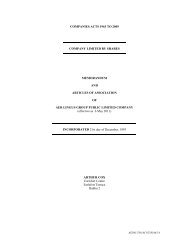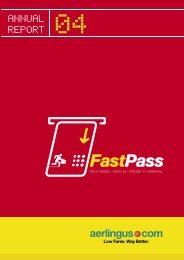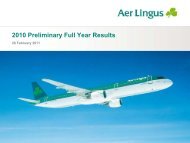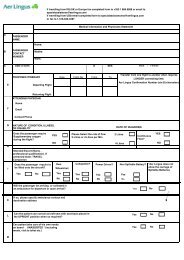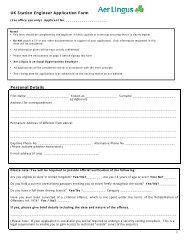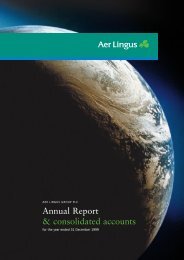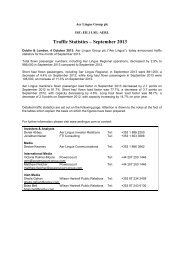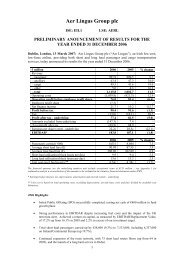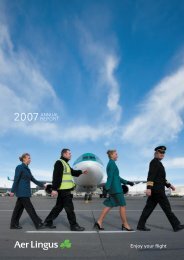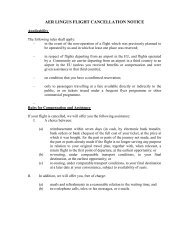annual report 2009 - Aer Lingus
annual report 2009 - Aer Lingus
annual report 2009 - Aer Lingus
Create successful ePaper yourself
Turn your PDF publications into a flip-book with our unique Google optimized e-Paper software.
54 Financial Statements <strong>Aer</strong> <strong>Lingus</strong> Group Plc – Annual Report <strong>2009</strong>Notes to the Consolidated Financial Statements [continued]2 Summary of significant accounting policies [continued]IFRS 2 (Amendment) Vesting Conditions and CancellationsThe amendment deals with vesting conditions and cancellations. It clarifies that vesting conditions are service conditions andperformance conditions only. Other features of a share-based payment are not vesting conditions. These features would need tobe included in the grant date fair value for transactions with employees and others providing similar services; they would not impactthe number of awards expected to vest or valuation thereof subsequent to the grant date. All cancellations, whether by the entity orby other parties, should receive the same accounting treatment. The Group has adopted IFRS 2 (Amendment) from 1 January <strong>2009</strong>.The amendment does not have a material impact on the Group’s financial statements.IFRS 7 (Amendment) Improving Disclosures about Financial InstrumentsThe amendment requires enhanced disclosures about fair value measurement and liquidity risk. In particular, the amendment requiresdisclosure of fair value measurements by level of a fair value measurement hierarchy. The fair value measurement disclosures arepresented in Note 3.3. The Group has elected not to provide comparative information for these disclosures in the current year inaccordance with the transitional reliefs offered in these amendments.IFRS 8 Operating SegmentsIFRS 8 replaces IAS 14 Segment Reporting, which required identification of two sets of segments – one based on related products andservices, and the other on geographical areas. IAS 14 regarded one set as primary segments and the other as secondary segments. IFRS 8requires a ‘management approach’ under which segment information is presented on the same basis as that used for internal <strong>report</strong>ingpurposes. This has resulted in a redesignation of the Group’s <strong>report</strong>able segments (see note 5), but has had no impact on the <strong>report</strong>edresults or financial position of the Group.IAS 1 (Revised) Presentation of Financial StatementsThe revised standard separates owner and non-owner changes in equity. The statement of changes in equity includes only detailsof transactions with owners, with non-owner changes in equity presented as a single line. In addition the standard introduces thestatement of comprehensive income. The statement of comprehensive income presents all items of recognised income and expense,either in one single statement, or in two linked statements. The Group has elected to present two statements: an income statement anda statement of comprehensive income. The revised standard also introduced a number of terminology changes including revised titlesfor the financial statements. The consolidated financial statements have been prepared using the revised titles.The following new standards, amendments to existing standards and interpretations have been issued prior to the date of issuanceof the Group’s financial statements but have not been early adopted by the Group:• IFRS 1 (Revised) First Time Adoption of IFRS (effective 1 July <strong>2009</strong>)• IFRS 3 (Revised) Business Combinations (effective 1 July <strong>2009</strong>)• IAS 27 (Amended) Consolidated and Separate Financial Statements (effective 1 July <strong>2009</strong>)• IFRIC 17 Distributions of Non-cash Assets to Owners (effective 1 July <strong>2009</strong>)• IFRIC 18 Transfers of Assets from Customers (effective 1 July <strong>2009</strong>)• IFRS 1 (Amendment) Additional exemptions for First-time Adopters (effective 1 January 2010)• IFRS 2 (Amendment) Group Cash-settled Share-based Payment Transactions (effective 1 January 2010)• IAS 32 (Amendment) Classification of Rights Issues (effective 1 February 2010)• IFRS 1 (Amendment) Limited Exemption from Comparative IFRS 7 Disclosures for First-time Adopters (effective 1 July 2010)• IFRIC 19 Extinguishing Financial Liabilities with Equity Instruments (effective 1 July 2010)• IAS 24 (Revised) Related Party Disclosures (effective 1 January 2011)• IFRIC 14 Prepayments of Minimum Funding Requirement (effective 1 January 2011)• IFRS 9 Financial Instruments (effective 1 January 2013)



